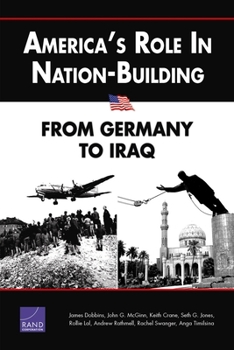America's Role in Nation-Building: From Germany to Iraq
Select Format
Select Condition 
Book Overview
A nearly 50-year review of U.S. efforts to transform defeated and broken enemies into democratic and prosperous allies.
Format:Paperback
Language:English
ISBN:083303460X
ISBN13:9780833034601
Release Date:July 2003
Publisher:RAND Corporation
Length:290 Pages
Weight:0.15 lbs.
Dimensions:0.6" x 6.0" x 9.0"
Customer Reviews
5 ratings
very informative
Published by Thriftbooks.com User , 17 years ago
This book was a great piece of writing for anyone that is interested in learning about how the U.S. helps rebuild nations. It was very useful for research that I was conducting.
America's Role in Nation-Building: From Germany to Iraq
Published by Thriftbooks.com User , 17 years ago
great background history to today's strategic events in Middle East
Good Background on Democratic Nation-Building
Published by Thriftbooks.com User , 18 years ago
This is one of the portfolio of books exploring what it takes to create successful democratic nation-building--From German to Iraq (as the subtitle notes). It is also one of the better volumes among such works. The RAND report goes into considerable detail, providing an operational definition of democratic nation building by looking at the commonalities in seven such interventions (Germany, Japan, Somalia, Haiti, Bosnia, Kosovo, Afghanistan). The report seeks to establish those factors associated with success or failure. Among those linked to success were the use of force "to underpin a process of democratization" (Page 1), occupation, peace enforcement, stabilization, and reconstruction. Success is (Page 2) ". . .the ability to promote an enduring transfer of democratic institutions." The RAND report suggests a number of prerequisites, including military presence over time by the occupying country, international police presence over time, reducing postconflict combat-related deaths, timing of elections, dealing with refugees and internally displaced persons, initial external assistance, external per capita assistance, external assistance as a meaningful percentage of GDP, and changes in per capita GDP. This obviously entails a commitment to provide substantial resources to the redevelopment effort, to be willing to invest considerable time to nation building, to make sure that appropriate security arrangements are made. In short, the process cannot successfully be done quickly or "on the cheap." Unhappily, the conclusions of this book--if accurate--surely raise questions about the ultimate success of the American involvement in Iraq.
For the interested reader and the expert
Published by Thriftbooks.com User , 20 years ago
This is one kind of pre-war analysis for post-war Iraq that the Bush administration is accused of ignoring. (Iraq-specific background is the other.) Indeed, the back cover attributes to CPA head Paul Bremer, "...a marvelous how-to manual...I have kept a copy handy...since my arrival in Baghdad." The book uses seven case studies in search of lessons for post-conflict reconstruction: Germany, Japan, Somalia, Haiti, Bosnia, Kosovo and Afghanistan. Each case study examines the challenges (security, humanitarian, civil admin, democratization, and reconstruction), the U.S. and international roles, what happened, and lessons learned. Overall conclusions include: of the many variables, the level of effort in time, manpower and money is perhaps most important; security must precede reform; political reform needs to be "legitimized" by economic growth; there are tradeoffs between multilateral and unilateral efforts; and having good neighbors helps. These conclusions are not earth-shattering, but the comparative effort is useful in itself and the lessons ought to have been helpful in Iraq. Compare this book with Orr's Winning the Peace (CSIS, 2004).
Excellent Policy Analysis with Congenital Defect
Published by Thriftbooks.com User , 21 years ago
This book present an excellent policy analysis of USA-led enforced democratization. Based on historic-comparative study of seven such cases (Germany, Japan, Somalia, Haiti, Bosnia, Kosova and Afghanistan), striking policy recommendations are derived on military and police presence over time, humanitarian help, economic reconstruction, building of civil society, holding of elections and more, as as to maximize success in democratization. In all these respects the book is outstanding, in terms of method and substance alike, as is to be expected from a RAND Corporation study. However, the book also demonstrates a widespread cultural blinder of USA policy thinking, namely underrating of cultural factors and over-optimism in respect to making the world democratic. Paradigmatic is the following statement, put forth without any reservations (on page 204) "democracy is transferable to non-Western...societies", followed by a definite statement that "there is no reason why Iraq cannot be democratized and establish democratic institutions and a pluralist polity". Little wonder that this frame of thinking, as applied in the book to Iraq, failed to foresee, at least as a contingency, what is now happening there, the idea of persistent and increasingly effective armed resistance against USA and other Western "democratizisers" after "victory" not being taken serious enough. If what is probably the best strategic Think Tank in the USA suffers from such misunderstanding of realities that do not fit into Western perceptions of "the other", there is much that USA policy makers and policy planners have to learn so as to enable the leading country of the West to fulfill is increasingly crucial role as the leading guardian of Western civilization and security.






